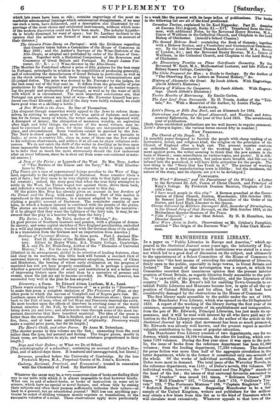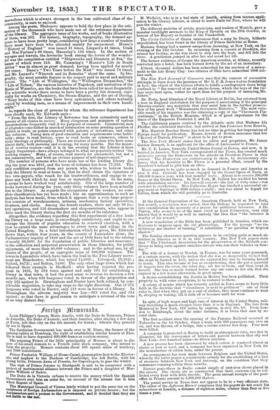THE MANCHESTER FREE LIBRARY.
IN a paper on " Public Libraries in Europe and America," which ap- peared in the Statistical Journal some years ago, the inferiority of Eng- land to other countries in regard to such institutions was stated in a man- ner which led to a good deal of discussion on the subject, and ultimately to the appointment of a Select Committee of the House of Commons to inquire into "the best means of extending the establishment of libraries, freely open to the public, especially in large towns, in Great Britain and Ireland." The result of that investigation was a report, in which the Committee recorded their unanimous opinion that the present inferior position of Great Britain, as regards libraries freely accessible to the pub- lic, " is unworthy of the power, the liberality, and the literature of this country." In 1850, Mr. Ewares bill for enabling Town-Councils to es- tablish Public Libraries and Museums became law, in spite of all the op- position of Colonel Sibthorp and his allies, but not till it had been considerably damaged by the obstructions in the House of Commons.
The first library made accessible to the public under the act of 1850, was the Manchester Free Library, which was opened on the 2d September 1852. A report of the working of the library during the first year of its existence, accompanied by reports of its establishment and inauguration, from the pen of Mr. Edwards, Principal Librarian, has just made its ap- pearance, and it will be read with interest by all who have paid any at- tention to the Free Library movement. As the author of the article in the Statistical Journal by which that movement has been so much promoted, Mr. Edwards was already well known, and the present report is another valuable contribution to the cause of popular education.
The Manchester Free Library consists of two departments, one for re- ference, which contains 18,104 volumes, the other for lending, which con- tains 7195 volumes. During the first year since it was open to the pub- lic, the issue of books from the reference department has been 61,080 volumes; from the lending department, 77,232 volumes. The demand for prose fiction was more than half of the aggregate circulation in the latter department, while in the former it constituted only one-seventh of the whole. Of the works of individual novelists, those of Scott and Defoe were most in demand. The total issue of the Waverley Novels, in the reference department, was 1141; of Defoe's novels, 984 volumes. Of individual works, however, the " Thousand and One Nights" stands at the bead of the list ; the issues of that universal favourite amounted to 294. " Ivanhoe" was issued 241 times, " Robinson Crusoe " 239 times, " Moll Flanders" 237, " Colonel Jack " 170, " Gulliver'e Tra- vels" 123, "The Fortunate Mistress" 108, "Captain Singleton" 107, " Roderick Random " 82 times. Supposing Manchester to be a fair sample of the United Kingdom, writers and publishers for the lair" may obtain a few hints from this list as to the kind of literature which will circulate most extensively. Whatever appeals to that love of the marvellous which is always strongest in the less cultivated class of the community, is sure to succeed. Among the poets, Shakspere appears to hold the first place in the esti- mation of the thousands who have made use of the reference department of the library. The aggregate issue of his works, and of books illustrative of them, was 352. For history, biography, topography, the demand ap- pears to have been pretty large, considering how large a number of readers there must have been who attended mainly for amusement. Hume's "History of England" was issued 31 times, Lingard's 41 times, Craik and Mae Farlane's 60 times, Macaulay's 124 times. In the section of voyages and travels, the favourite book among the lovers of the wonder- ful was the compilation entitled "Shipwrecks and Disasters at Sea," the issues of which were 215. Mr. Cumming's " Hunter's Life in South Africa" was in almost as great demand, having been applied for nearly 200 times. Dana's "Two Years before the Mast" was issued 74 times, and Mr. Layard'a "Nineveh and its Remains" about the same. In bio- graphy, the most notable feature is the respect paid to naval and military heroes. The " Life of Wellington," the " Wellington Despatches," the "Life of Nelson," the -various histories of Napoleon, and narratives of the Battle of Waterloo, are the books that have been called for most frequently. For scientific works there seems to have been a pretty fair demand, espe- cially for works on Chemistry, the Steam-Engine, and the art of Dyeing. "Many books of this class have been epitomized, and others textually copied by working men, as a means of improvement in their own handi- crafts."
As regards the class of persons by whom the reference department has been chiefly used, Mr. Edwards says- " From the first, the Library of Reference has been extensively used by persons of all classes in society. Many clergymen and ministers of various denominations frequently visit it for purposes of research. Commercial men of all grades come hither in search of information on some pending question of politics or trade, on points connected with patents of inventions, and other like subjects. Young men of good education and acquirements come habit- ually; some to read history, some to read books on commerce, others to study theology or philosophy. There are readers of this class who have come almost daily, 'both morning and evening, for many months. But the major- ity of evening readers—and it is in the evening that the Library is most largely frequented—have always belonged to what are popularly termed 'the working classes.' Many, of course, read merely for amusement, but not a few consecutively, and with an obvious purpose of self-improvement."
The number of persons who have made use of the lending library du- ring the year was 4841, and the issue of volumes has been 77,232. The only condition required from any person who wishes to borrow books from the library to read at home is, that he shall obtain the signature of two rate-payers, who vouch for his trustworthiness, and engage to re- place any book which he may lose or materially damage. In the main, it seems to have worked very satisfactorily. Out of the large number of books borrowed during the year, only three volumes have been actually lost to the library. As regards the occupations of the readers, no com- plete classification has yet been made ; but an approximation to such an analysis has been made, from which it appears that a very large propor- tion consists of warehousemen, artisans, mechanics, factory operatives, ahopmen, and clerks. Among the female readers, there are only 90 fac- tory operatives, and 110 dressmakers and shop-assistants, who appear to have used the library during the first six months of its existence.
Altogether, the evidence regarding this first experiment of a free lend- ing library on a large scale, is exceedingly satisfactory, and ought to en- courage the friends of popular education to renewed exertion, with a view to extend the same advantages to every town and village in the United Kingdom. In a brief introduction which he gives, Mr. Edwards shows that, within four years, in the county of Lancashire alone, the Parliamentary inquiry of 1849 and the act of 1850 have led to the raising of nearly 50,0001. for the foundation of public libraries and museums ; to the collection and perpetual preservation in those libraries, for public enjoyment, of more than 60,000 volumes ; and to the actual use, by all classes of the people, of an aggregate issue of 380,000 volumes. The towns hi Lancashire which have taken the lead in the Free Library move- ment are Manchester, which has raised 14,6091.; Liverpool, 19,362/. ; Salford, 84721.; and Bolton, 34801. The only other large town which has followed their example is Sheffield : after having rejected the pro- posal in 1851, by 294 votes against and only 104 for establishing a library in that town, it had the good.sense to reverse its decision a few months ago, when 838 burgesses voted in favour of the proposition and only 232 against it. Birmingham and Exeter have both refused, by con- siderable majorities, to take any steps in the right direction. Out of 971 burgesses who voted in Exeter, only 118 were in favour of a library. In Birmingham the adverse majority was less-363 voted for, and 534 against; so that there is good reason to anticipate a reversal of the vote at no very distant day.



































 Previous page
Previous page